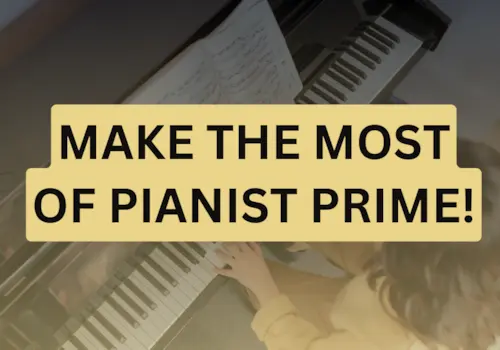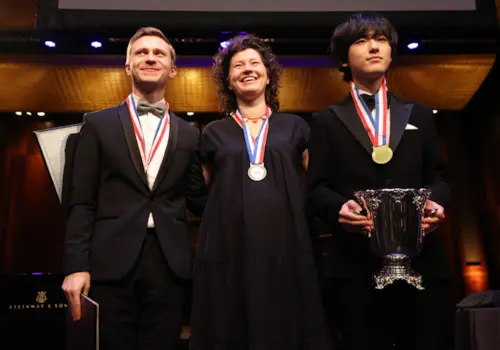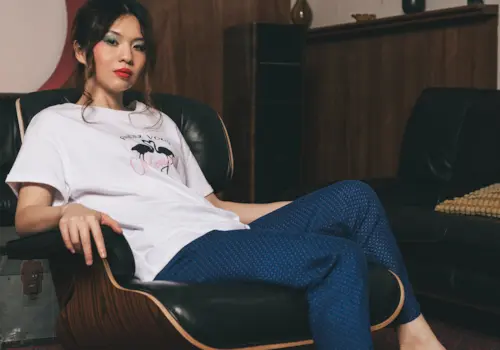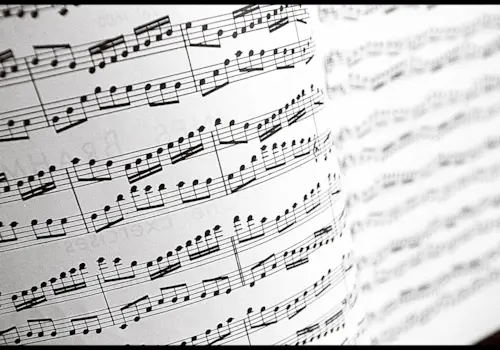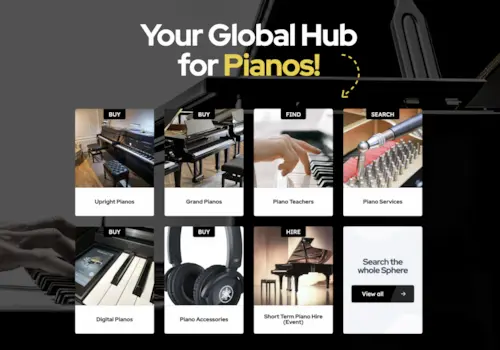Just how do you go about choosing a competition winner when there are so many worthy winners? Pianist editor Erica Worth breaks down the process
It all began some 20 years ago, when I was reading about the many competitions in the US designed specifically for amateur pianists over the age of 30.
I knew that Pianist had to do something similar and in 2005 we set up a similar competition with partners Yamaha, culminating in a glittering Finals gala evening held at London’s Cadogan Hall.

The Pianist 2005 Amateur Piano Competition finalists. From left to right: Howard Wolfin; Steve Doig; Eddy James (Winner, Modern); Sabine Vinck (Winner, Classical); Tim Morris; Rupert Eggerton-Smith; Nigel Rogers
Much has changed over the years – YouTube, Instagram, Facebook and the rest spreading like wildfire, so it made sense to reinvent the wheel – this time we’d run an online competition, inviting applicants to record themselves via video. Yamaha jumped on board again, and we were nearly set.
My first step was to approach two trusted colleagues from the music industry – Melanie Spanswick and Matt Ash – to ask if they’d be interested in sharing the preliminary judging duties with me. No persuasion was required: they loved the idea and the competition was born. After that, it was plain sailing.
We wanted the competition criteria to be as simple as possible: There would be two categories, Classical and Modern (hence, two winners). Anyone over the age of 25 and of any nationality could enter, as long as they were not professional performers. Entrants should play a minimum of two pieces, preferably showing different styles. When ready, they would upload their videos online.
Simple.
The prize? The winners would each receive a Yamaha upright piano worth up to £10,000 and a package of online exposure to help kickstart a dream career. The competition was launched on 1 March 2023, with a deadline of early July. Lots of time to prepare, then.

The Yamaha CLP 775 was one of two pianos up for grabs
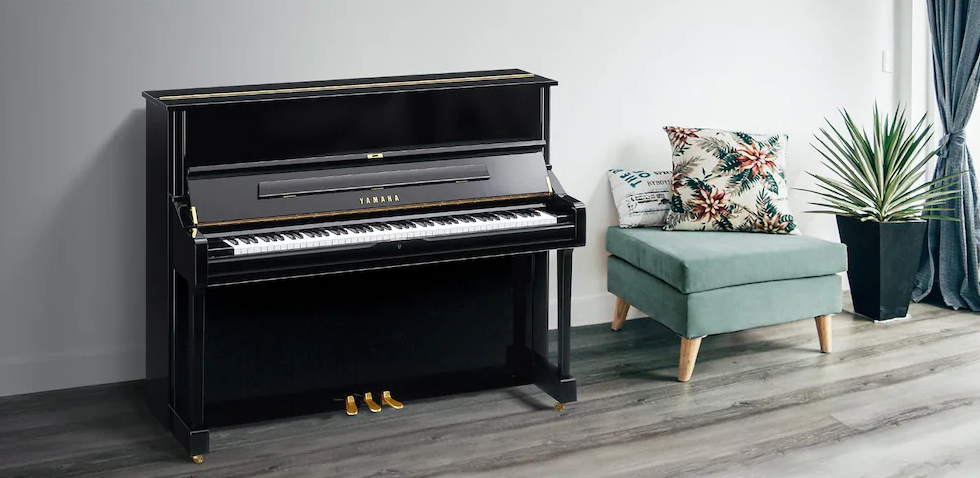
The Yamaha U1, also included in the prize package
Decisions, decisions
Playing the piano in front of a camera and judges isn’t one of life’s easier challenges. It takes plenty of time, at least a measure of technique, a healthy dash of confidence and – unavoidably – a sprinkling of talent. So imagine how thrilled we were when, come mid-July, we counted up over 90 entries! There were Beethoven sonatas, Bach fugues, Chopin nocturnes, Debussy préludes, composers unfamiliar plus doses of Latin, jazz, movie music and Coldplay – from a range of pianists young and old, from all walks of life and from all corners of the globe.
Melanie, Matt and myself carefully listened to all the applicants, from beginning to end. We were extremely organised and concentrated in our judging. ‘What was so impressive,’ remarked Melanie, ‘was the amount of time that people must have spent doing this. Some of these performances were so heartfelt, obviously meaning so much to so many people, that it made the whole judging process so worth while.’
Said Matt: ‘Whilst everything was not going to be top quality, we recognise that even those performing for the first time were doing it with real integrity and love.’ Via phone and email we compared notes, narrowing down the entries to a 31-strong shortlist.
And the winner is...
Here’s where finals judges Chloe Flower, Kathryn Page and Iyad Sughayer took over. I am delighted to say they were pretty unanimous in their decisions.
The Classical category Prize was awarded to 38-year-old Annie Kwon, a homemaker and piano teacher from California, USA, who performed works by Liszt, Scarlatti, Sibelius and Babajanian.

Annie Kwon has been awarded First Place in the Classical Category
Kathryn Page enjoyed her effervescent clarity in the Sibelius Etude and her instinctive phrasing in the Liszt Widmung. She found Annie’s Scarlatti ‘sparkling and bubbly playing – exactly what was needed.’ To summarise, ‘An extremely persuasive performance, Annie communicates all the musical needs with beauty of sound and effortless control. Bravo!’
Chloe Flower was equally moved by Annie’s natural musicality and her emotive performance, mentioning a great technique and a wonderful way in bringing out the inner voices.
The Modern category Prize went to 53-year-old Rob Rennie, a software engineer, also from California. He wowed the judges with a mixed bag of works by Monk, Mingus, Powell and Evans.

Rob Rennie was awarded 1st Place in the Modern Category
Page found his Mingus Better Get Hit in Your Soul full of rhythmic and exciting energy, exuding an obvious love for the piece being communicated. In Monk’s Monk’s Dream she found ‘very atmospheric playing, with space and shape used effectively. A subtle rhythmic thread held it together with conviction.’ And in Evans’s Epilogue she was persuaded by ‘gentle and sensitive playing, creating a very wistful shape and a wonderful conclusion to the programme.’ Chloe Flower was also taken with his passion and feeling for the music.
What the winners say
Glowing remarks from some tough critics. The winners themselves were thrilled but also shocked by the accolades.
‘I was totally not expecting to win’, exclaimed Annie, when I called her to tell the news. ‘Initially I was only going to play three pieces: Liszt, Scarlatti, Sibelius. But then I randomly came across the Arno Babajanian Elegy, and it just stuck to me. I had two months to prepare that one!’
Having received her bachelor’s degree at the University of California, Irvine, Annie took a break from the piano: ‘I graduated in 2007, but after that I hadn’t performed or played in 17 years. I had a love-hate relationship with piano. I felt it was expected of me. Now I have a new love for it.’
Today she juggles the life of a mother of three young children with that of part-time piano teacher. ‘When I told the children I’d won, they were so excited,’ she explains. ‘They said there were so proud of me and that they told all their friends!’
Has winning the competition changed things? ‘It’s now made me think: Can I put my foot in the door again? Can I? Should I? Maybe to have a social media presence and to perform again. I never really had that confidence. I think one of my strengths is sight-reading; I can learn a piece pretty fast, but the problem with that is that I never really know a piece. This time around I really want to get into the theory and harmony. That’s my goal. That’s my new challenge.’
You can read Annie's winning interview in full, here.
Rob Rennie was equally shocked when informed of his victory: ‘Surprised would be an understatement,’ he laughed. ‘It’s mind-blowing. I read your magazine, cover to cover, I try to sight-read the scores first, without listening, and listen to the CD afterwards in the car. I have been reading it since issue 87.’
Music to this writer’s ears, naturally. Unlike Annie, Rob was self-taught: ‘I started by teaching myself in my late teens. Then I had private lessons for four or five years with two different teachers who were so instrumental in everything I became. The first taught me blues and the second teacher was a specialist in bebop. For me, the piano is all about wood and steel… and it’s amazing to me the way that different people can make a different sound. That’s my thing. That’s what I am working on. I play two hours every day, and that’s for almost 35 years now. I don’t like to go on vacation unless there’s a piano where I am staying!’
What next for this dedicated pianist? ‘You never think you’re good, you always doubt yourself… it’s nice to get some recognition after all these years! I am looking to leverage this a little to get into some more solo gigs. I had a trio of my own before the pandemic, but that ceased. My niece says she’s going to call me an international award-winning pianist now!’
You can read Rob's winning interview in full, here.
Annie and Rob will be receiving their piano prizes shortly, and we’ll keep you posted as to their new online exposure. Piano competitions are never cut and dried affairs – and certainly not foregone conclusions – and decisions made by judges or critics will always be subjective. The comprehensive list of results appears in the box opposite and all 31 finalists’ names can be found on the Pianist website.
Finally, I must say a heartfelt thank you, if not in person, to everyone who entered: competitions are nothing without competitors! If your name isn’t mentioned, please don’t be discouraged – we were impressed by so many entries. Watch this space: we are sure to launch the next amateur piano competition very soon...

